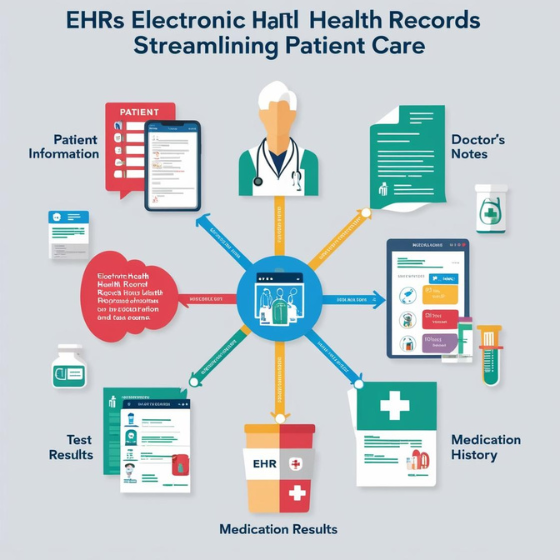How Electronic Health Records Are Streamlining Patient Care
In today’s fast-paced healthcare industry, Electronic Health Records (EHRs) are revolutionizing patient care. According to a study, over 85% of healthcare providers in the U.S. now use EHRs to enhance efficiency and improve patient outcomes. But how exactly are these digital tools transforming the landscape of modern healthcare?
This blog delves into how electronic health records are streamlining patient care, examining their benefits, challenges, and the future of digital healthcare. Whether you’re a healthcare provider or tech enthusiast, this guide will provide valuable insights into EHR systems and their role in shaping patient care.
The Evolution of Electronic Health Records
What Are Electronic Health Records?
EHRs are digital versions of patient medical records that provide healthcare professionals with real-time access to accurate, updated, and comprehensive patient information.
From Paper to Digital: The Shift in Healthcare
Traditional paper-based record-keeping systems were prone to errors, delays, and inefficiencies. EHRs address these issues by offering:
- Centralized data storage
- Faster access to patient history
- Improved coordination among healthcare teams
How Electronic Health Records Are Streamlining Patient Care
1. Improved Accessibility and Efficiency
One of the primary ways how electronic health records are streamlining patient care is by improving data accessibility.
- 24/7 Access to Records: Healthcare providers can access patient data anytime, anywhere, ensuring continuity of care.
- Reduced Administrative Burden: Automation of tasks like appointment scheduling and billing frees up time for patient care.
Example: A study found that hospitals using EHR systems saved 15 minutes per patient interaction, allowing providers to focus more on patient needs.
2. Enhanced Patient Safety
EHRs minimize errors, ensuring patient safety in multiple ways:
- Medication Alerts: Automated alerts warn of potential drug interactions or allergies.
- Standardized Protocols: EHR systems guide providers to follow evidence-based care protocols.
- Accurate Documentation: Real-time updates reduce the risk of misinformation.
Did You Know? Studies suggest that hospitals with EHRs experience a 20% reduction in adverse drug events.
3. Better Care Coordination
EHRs enable seamless collaboration among healthcare teams, which is crucial for multi-disciplinary care.
- Shared Patient Records: All providers have access to the same updated information.
- Specialist Referrals: EHRs simplify the process of referring patients and sharing diagnostic data.
Real-World Scenario: In a cardiac care unit, EHRs helped specialists reduce duplicate tests by 30%, saving time and resources.
4. Personalized Patient Care
EHRs provide insights that allow for tailored treatment plans:
- Data Analytics: Predictive analytics identify patient risk factors, enabling preventive care.
- Patient Portals: Patients can view their medical history, test results, and treatment plans.
- Telehealth Integration: EHR systems integrate with telemedicine apps to ensure seamless virtual consultations.
Want to create a patient-friendly app? Check out Sodio’s Mobile App Development Services.
5. Compliance and Data Security
Regulatory compliance and data security are critical in healthcare. EHRs ensure adherence to standards like HIPAA and GDPR.
- Secure Data Storage: Encrypted storage systems protect patient information.
- Audit Trails: Track changes to ensure accountability and transparency.
- Disaster Recovery: Cloud-based backups prevent data loss during emergencies.
Partner with Sodio for secure and compliant EHR solutions. Contact Us Today.
Challenges in Implementing EHRs
Despite their benefits, implementing EHRs comes with challenges:
High Initial Costs
Developing and integrating EHR systems require significant investment.
Solution: Sodio offers scalable, cost-effective EHR solutions tailored to your needs.
Training and Adoption
Healthcare staff may face a learning curve when transitioning to EHR systems.
Solution: Provide comprehensive training and support to ease the adoption process.
Future Trends in EHR Systems
Artificial Intelligence (AI) in EHRs
AI is revolutionizing EHR systems by:
- Automating administrative tasks
- Enhancing predictive analytics for patient outcomes
- Streamlining clinical workflows
Blockchain for Security
Blockchain ensures secure, immutable data storage, reducing risks of breaches and tampering.
Voice Recognition Technology
Integrating voice recognition allows providers to dictate notes directly into the system, saving time.
Stay ahead of the curve with Sodio’s AI-Powered Solutions.
Why Choose Sodio for EHR Development?
At Sodio, we specialize in how electronic health records are streamlining patient care through:
- Custom EHR Development: Tailored to meet your unique requirements.
- HIPAA-Compliant Systems: Ensuring top-notch security and privacy.
- Integration Services: Seamlessly connect EHRs with other healthcare technologies.
Let’s transform healthcare together. Schedule a Free Consultation today.
Conclusion
EHRs are the backbone of modern healthcare, offering unparalleled benefits in accessibility, efficiency, and patient safety. Understanding how electronic health records are streamlining patient care helps providers leverage technology to improve outcomes and reduce costs.
Sodio is committed to empowering healthcare providers with innovative, secure, and efficient EHR solutions. Ready to make the leap into the future of healthcare?






